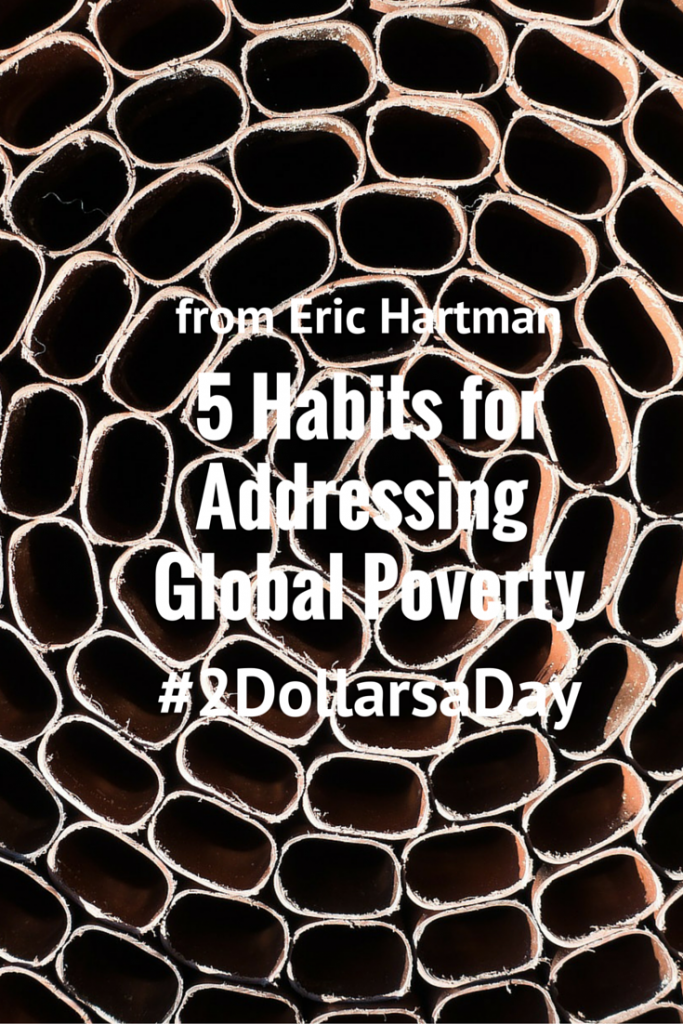5 Habits for Addressing Global Poverty
Shawn Humphrey, The Blue Collar Professor and social entrepreneur behind the Two Dollar Challenge, asked me to consider – along with other colleagues:
“What is my role in the story of poverty’s end?”
As a professor, it is always tempting to profess the capacity to answer.
I wish I knew.
Unfortunately, in this case, providing a clear answer would be both incorrect and intellectually dishonest.
It would be incorrect because no one person knows the whole structure of any global story and because poverty is a slippery concept. It would be dishonest because I’m just barely smart enough to know I don’t know. So – despite what some would call a ridiculous amount of education, experience, and time spent thinking about this question- I can not give you a definitive answer.
But here’s the thing: I deeply desire a role to play. Like you, I’d love to be using my time on this earth to somehow contribute to – or at least not negate – the creation of a more just world.
Through nearly two decades of work and study in international and community development, I’ve learned the importance of cultivating these six capacities:
-
Learn to listen, see, and empathize. These skills can be sharpened and strengthened; they can also atrophy and wither. They are not inherent. Cultivate these capacities. Consider approaches to better listening and seeing from sources as broad as the business sector, human-centered design, or participatory action research. You can also actually build your empathetic muscles through understanding related research insights, and even simply reading literature about other peoples and places, actively listening to people from different walks of life, and immersing yourself in unfamiliar environments as a learner.
So be a learner. Don’t just do something, sit there. Grow in understanding through others’ insights. Distrust yourself. Just because you were in a room and someone spoke doesn’t mean you heard. Just because you visited a place doesn’t mean you saw it. Systematically strengthen the possibility that you could see, hear, and feel beyond your own biases and perceptions.
-
Learn to amplify responsibly. If you listen continuously and carefully, eventually, someone may ask you to share a story. Do so as a sidekick, with the capacities of someone who has done their homework on intersectionality and how to be a good ally.
I, like many readers, come from several positions of privilege. But that analysis can not end at paralysis. I must realize that I should not attempt to solve, think for, or speak for. Rather, understanding privilege should lead me to leverage privileges appropriately when I’m asked to collaborate with. In my own experience, that led me to the opportunity to work with a rural Jamaican community on a new model of community tourism called Fair Trade Learning.
Fair Trade Learning from Kindea Labs on Vimeo.
-
Don’t quit. It will be tempting to quit, give in, acquiesce, or normalize. Don’t. Hold on to the possibility that you’re right about your sense that too much injustice exists in the world while being wrong about your first and second impulse regarding how to fix it. Stay in that struggling, murky space of uncertainty. Know that this world is merely the one we have created, and that other worlds remain possible, but only through careful collaboration. Collaboration takes listening, observation, patience, and time. Stick with it.
-
Agitate. Ask why. Suggest – insist – that other ways of being, doing, and living are possible. Policy matters: The minimum wage was impossible until it existed. In 1969 the US was so polluted that Cleveland’s Cuyahoga River caught fire, prompting the passage of the Clean Water Act and an end to that era. Costa Rica achieves the same life expectancy as the United States, with significantly less per capita income.
These and numerous other facts across histories and cultures demonstrate that different laws, customs, and assumptions can lead to different realities and different outcomes. Imagine better possibilities. Investigate other systems. Insist upon better alternatives, and pursue them. Consider the domestic and international advocacy resources offered by Amnesty International, Oxfam,Results, and others. Always do so in collaboration, with a learning orientation, in light of the other commitments in this list.
-
Refuse to be satisfied. There’s no question we live in an interdependent world. Understanding the source of your smartphone makes that painfully clear, as does the Story of Stuff throughout your home. Many of our lives are made easier through interdependence, but we have yet to engage that interdependence ethically. Until we understand and can account for the ways in which we ethically interact with other people and the broader environment, continue to ask the question – What is my role in the story of poverty’s end?

+++++
Eric Hartman is an Assistant Professor in the Staley School of Leadership Studies at Kansas State University and editor of globalsl.org. He has spent the last fifteen years as a researcher, educator, and executive director in global service-learning and international volunteering. You can contact him on Twitter.

 Previous Post
Previous Post Next Post
Next Post